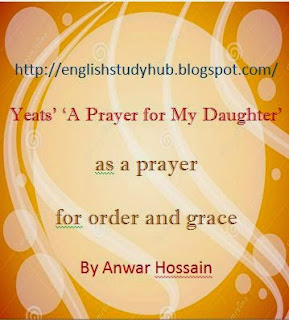Yeats' ‘A Prayer for My Daughter’ as a prayer for order and grace
‘A Prayer for My Daughter’ is a personal poem which
reflects the gloom of the poet and his fear of a stormy future. The poem was
written in 1919 after the First World War and it reflects the post war
frustration. The war ended in 1919 but Ireland
The poet expresses concern for his infant daughter who
is fast asleep in a cradle. The storm is blowing outside and it makes the poet
gloomy. He imagines the war drums which forecast the struggle for survival. The
cruelty of man is greater than the murderous innocence of the sea. She must
have a shield for protection. The poet wishes for his daughter to have beauty
but not vanity. Great beauties like Helen- that here represents his girl
friend, Maud Gonne and Venus, the Goddess of love stumbled into unhappy
marriages because of lack of courtesy and humanity. The poet wants his daughter
to cultivate courtesy:
Beauty to make a stranger’s eye distraught.
The poet wants his daughter to cultivate natural
gladness that means the scattering of happiness and peace around. But one thing
that he wants her to avoid is hatred. Hatred is the worst of all evils. He
wishes that his daughter may grow up and get married in an aristocratic family
that observes traditional manners and courtesies. Beauty and innocence come
from established custom and usage. ‘Ceremony’ is like the Horn of Plenty and
custom is like the growing laurel-tree providing shade and comfort to all. This
is the way of life that he wants his daughter to follow.
The prayer for his daughter’s survival becomes also a
prayer for an improvement in the world. One can call the poem a manifesto of
Yeats’s personal ideas of old age of settled life and established values. In
the end, the poem is a prayer for order and grace in a worn out civilization.



Comments
Post a Comment